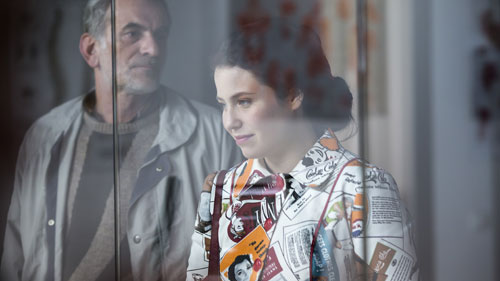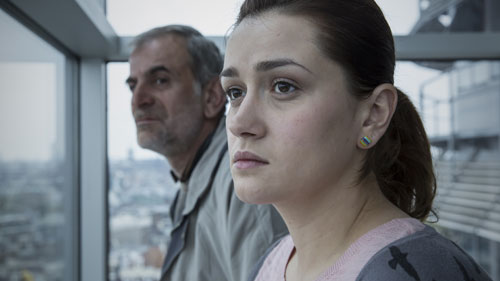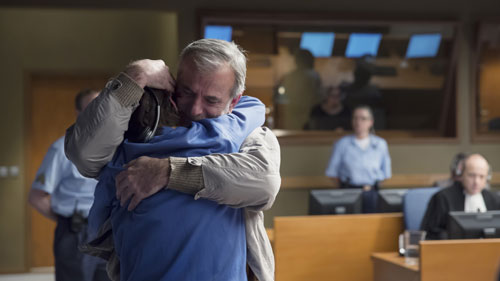***
recensie The Prosecutor the Defender the Father and His Son
Politiek steekspel
door Ralph Evers en Dragan Markovic
In deze reconstructie van een op waargebeurde feiten gebaseerde casus van het Joegoslavië Tribunaal staan een aanklager en een advocaat lijnrecht tegenover elkaar. Na een belastende verklaring van een getuige is diens toekomst wellicht niet meer zeker.
Deze recensie is geschreven door zowel Ralph Evers als gast-recensent Dragan Markovic. Hij zal zichzelf hieronder introduceren en de film vanuit zijn ervaring als medewerker bij het Joegoslavië Tribunaal geven. Daarnaast is hij van Servische origine, dus kijkt hij met andere ogen naar deze film, dan Nederlanders.

Blinddoek
The Prosecutor the Defender the Father and His Son is gebaseerd op ware feiten, hetgeen zich vertaalt in de beschuldiging van een zekere Milorad Krstić, die oorlogsmisdaden zou hebben begaan. Dit lijkt een verwijzing naar de veroordeling van de Servische generaal Radislav Krstić in 2001. Aanvankelijk volgen we de verhaallijn vooral in het tribunaal zelf. Dit is op zich interessant genoeg in beeld gebracht, met name door de manier waarop de buitenwereld (de pers) al dan niet op afstand gehouden wordt. Hoe de advocaat afgekapt wordt, hoe de zittingen voortdurend verdaagd worden, en het gesmiespel tussen de rechters, waar de rest niets van mee krijgt. Regisseuse Iglika Triffonova tornt aan de blinddoek van Vrouwe Justitia, die mogelijk niet zo onpartijdig is als we wensen.
Toch beperkt de film zich niet tot een rechtbankdrama. Hij tracht een laagje dieper te graven en de kijker enige context mee te geven. Zoals een ieder die zich verdiept heeft in het Joegoslavië-conflict wellicht wel weet, streden er nogal wat belangen, opportunisme en zogenaamd historische claims om een plaats. De “gewone man” echter moest vooral zien te overleven en dat deed men niet zelden pragmatisch. Dat vertroebelt de vraag naar goed en kwaad.
De advocaat, Mikhail Finn, wil de achtergrond van de jonge getuige tot op de bodem uitzoeken en reist met een tolk naar de afgelegen binnenlanden van Bosnië. Een ruig landschap met een afgelegen gehucht is waar hij terechtkomt. Zoals vaker te zien zal zijn, speelt de film met contrasten. Rijk en arm, stad (Amsterdam en Den Haag) en platteland (Bosnië) en wellicht de belangrijkste: goed en kwaad.

Troef
Hierin komt dan ook de sterkste troef van de film tot uiting. Finn ontdekt dat de vader van de getuige nog leeft, terwijl de getuige niet beter weet dat hij wees is. Toch ligt hierin een risico verbonden, Finn kan ernaast zitten. Desondanks neemt hij het risico en reist samen met de vader (Alexander Lekić) terug naar Nederland. Dit stuk is erg geloofwaardig uitgewerkt.
Het is het menselijke drama dat de film overtuigt. Hierin worden de aanvankelijke tegenstellingen tussen de verdediger en de aanklager ontmaskerd. Goed of fout, zwart of wit, valt niet meer zo gemakkelijk vast te pinnen. Daartegen is het tribunaal slechts het decor.
Mixed feelings
The beginning of the film is quite disappointing. It follows the stereotype in which a Bosnian Serb is the villain presented with a big head, small eyes and a face full of scars, while the victim is thin and pale with big blue eyes. Add to this quite unprofessional mistakes, like name Dejan being misspelled as Deyan and the fact that the villain, who is supposed to be a Serbian teacher, somehow has a heavy foreign accent. The film was heading for a disaster.
However, just when I thought that watching this film would be more painful then passing a kidney stone, it took a turn for the better, especially when the whole scenography moved to Bosnia. Next to the beautiful scenes of local landscape, the whole Bosnian cast has done a great job, especially Izudin Bajrovic. This is also where the director managed to get all the details right and pinpoint cultural differences and small things visible especially to the people who lived in both cultures (West and East Europe in this case).

Presentation
This is obvious in very emotional and interesting dialogues between Jasna (Nermina Lukac) and Izudin Bajrovic, but also in smaller facts like the Bosnian person from a certain background would remove his shoes when entering a house. Or a pat on the knee of another person as a sign “well done” which, as we can only imagine, made a Swedish lawyer (played by Samuel Fröler) feel very uncomfortable due to the “invasion of his personal space”.
Another two things which were extremely well presented were costumes (perfectly fitted for all the characters, especially the ones from Bosnia) and the reactions of a Bosnian person who comes to the Netherlands for the first time and the way he observes this new country. Due to the fact that I have experience with people from this area coming to the Netherlands, this couldn’t have been better presented.
Crisis
Unfortunately, at the very end one can’t escape the feeling that the film has completely missed the point. Instead of focusing on the fact that such an important institution like ICTY (International Criminal Tribunal for the former Yugoslavia) uses different techniques in order to make witnesses give false testimonies and get the story they want, it puts the accent on the fact that the villain (a Bosnian Serb) was not convicted thanks to the fact that the star witness lied. Even in this highly politicized international court as ICTY applies the rule “the accused is Innocent until proven differently”.
This all makes us wonder if the fact that films that come from East Europe and are being financed by EU (in one way or another) are getting the same funds only if they stick to the certain official stories. I suppose that we do live in the time where film, just as investigative journalism, which used to move boundaries and give new points of view, is in the same crisis.
Dragan Markovic is psychologist, former ICTY worker and former member of various defend teams.
4 april 2016
